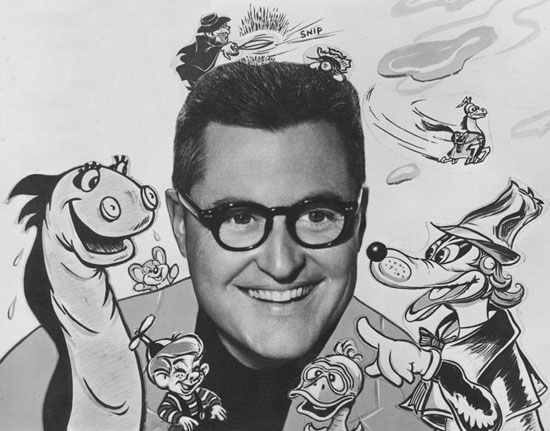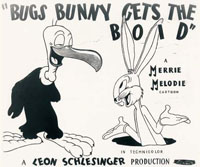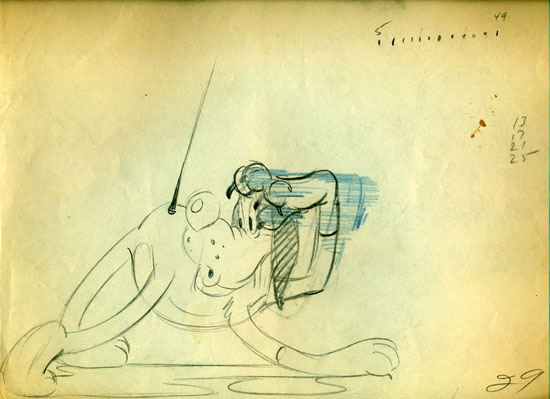
Animation Legend Bob Clampett was born May 8th, 1913 which means he would have been one hundred years old this year.
Once upon a time, there would have been tributes in magazines and salutes at film festivals despite the controversy that swirled around Clampett in his later years where some peers labeled him an egotistic self-promoter who allegedly took more credit than he deserved for the work done on Warner Brothers cartoons in the Golden Age.
Those who met and talked with Bob as I did many times before his sad passing in May 2nd, 1984 found a man who was funny, likeable, knowledgeable and kind with a real passion for animation.
Unfortunately, he is no longer around to defend or explain himself but thankfully there are interviews where those interested in the Golden Age of Animation can still hear his stories the way he told them.
Here is an excerpt from one of my first interviews with Clampett at his studio in September 1978. I have concentrated on some of his tales of working at Warner Brothers.
After graduation from high school in 1931, Clampett began as an animator for the Harman-Ising studio which was producing the Looney Tunes and Merrie Melodies series for Warner Brothers. When Leon Schlesinger took over the series of cartoons, Clampett continued with the series and worked alongside many legendary animation figures including Tex Avery, Chuck Jones and Friz Freleng.
During his roughly sixteen years with the studio, Clampett played a key role in the development of the Warner cartoons style of humor and characters. As a director, his exaggerated style is instantly recognizable. Clampett left Warners in 1946 and found even greater success with his personal project, Beany and Cecil.
 Jim Korkis: Did working at Warners Studio lot influence the animation?
Jim Korkis: Did working at Warners Studio lot influence the animation?
Bob Clampett: Definitely. Across the alley from us were sound stages and we’d see these great actors all day. Jimmy Cagney and Humphrey Bogart and other top Warner stars used to stick their heads in our windows to see how cartoons were made. We patterned a lot of things on them. Of course, we caricatured them many times but I also feel that the brashness of their characters helped inspire some of our characters.
JK: Why was the term “supervision” used in the old Warner cartoons instead of director?
BC: Leon Schlesinger called his head cartoonists “supervisors” which I believe he took from Irving Thalberg who called his key film makers at MGM “supervisors”. I think that Leon was smart enough to know that if he called his head cartoonist the supervisor that the audience would think that the supervisor was just the bookkeeper or the pencil lead dispenser. So, when Leon went to the race track, they’d say “Hey, that was a great cartoon you drew last night, Leon.” And he’d just smile. Remember, in those days people thought that Walt Disney did everything himself from drawing the animated cartoons to the comic strip to everything else. Sometimes even people in the business didn’t know who was doing what. It has only been in recent years that some of these talented people have started to get credit for their work.
JK: Why is some of your direction so wild?
BC: When I’m speaking at conventions, I get asked that question a lot. The only answer I can give is “That’s just the way I saw the world.” To me, it would have been odd to direct any other way. I remember when I was making Porky in Wackyland which was very unusual for its time, Leon would walk into the projection room when I was running dailies and moan “Oh no! Clampett’s wet dream!” We only had about three weeks to make each short and a budget of about $3,000. I believe it was Ray Katz who used to say “We don’t want quality and we don’t want it in the worst way”. All that was important was that a cartoon was ready to meet the schedule for a play date at the theater. But some of us just had fun doing them. I guess that was our compensation for the time pressure.
 JK: Have any particular silent comedians influenced your work?
JK: Have any particular silent comedians influenced your work?
BC: Of course. Bits and pieces, attitudes, actions, timing poses, facial expressions, gags, etc. of the top comedians over the years have been very inspirational. I could get into many facets but let me give you just one example. I got to know Harold Lloyd and I had long talks with him about how he constructed his silent comedies. I saw his Freshman football comedy many times and there was a gag in there that inspired a gag I used in Bugs Bunny Gets the Boid. When you’re writing a story about Bugs out in the desert you say to yourself, “What props do I have to work with? Well there’s cactus, sand, the skull of a steer, bones and so forth.” I remembered Lloyd’s gag in which he was substituting for the tackling dummy in the sawdust pit. He is hit by a hard tackle and lands with one leg out of sight under the sawdust. Looking down he sees a leg that has become disconnected from the tackling dummy and thinks it is his own leg. This was done very humorously. That bit came to my mind just as I was thinking “What do you do with the bones?” I got the idea to have Bugs land in the sand near a skeleton of a steer and when he comes to he feels the ribs of the skeleton and thinks it is his own body. He cries, and then to lighten the situation I had Bugs make an aside to the audience, “Gruesome, isn’t it?”
JK: I see the word “Freep” used a lot in your cartoons. What is a “Freep”?
BC: Freep is a word we used at Warners which meant a cross between a Freak and a Creep.
JK: What is your favorite cartoon?
BC: As far as I’m concerned, I never feel that any of them are what I’d like them to be. So I’d rather leave that judgment up to the audience. If they like a particular one, that’s fine with me. In fact, it’s wonderful.
JK: How would you like Bob Clampett to be remembered?
BC: I’d just like to be remembered. Period.



 Jim Korkis is an internationally respected animation historian who in recent years has devoted his attention to the many worlds of Disney. He was a columnist for a variety of animation magazines. With his former writing partner, John Cawley, he authored several animation related books including The Encyclopedia of Cartoon Superstars, How to Create Animation, Cartoon Confidential and Get Animated’s Animation Art Buyer’s Guide. He taught animation classes at the Disney Institute in Florida as well as instructing classes on acting and animation history for Disney Feature Animation: Florida.
Jim Korkis is an internationally respected animation historian who in recent years has devoted his attention to the many worlds of Disney. He was a columnist for a variety of animation magazines. With his former writing partner, John Cawley, he authored several animation related books including The Encyclopedia of Cartoon Superstars, How to Create Animation, Cartoon Confidential and Get Animated’s Animation Art Buyer’s Guide. He taught animation classes at the Disney Institute in Florida as well as instructing classes on acting and animation history for Disney Feature Animation: Florida.




















































I’m definitely a Bob Clampett fan.I do like his Warners work,but I’m more of a Beanie And Cecil fan and even more of a fan of Time For Beanie,the puppet show it sprang from.As far as him being perceived as egotistical,he apparently thought he had the talent to back it up.
Yes… egotistical compared to which of the other directors that were trying to claim the glory for themselves? From what I’ve read, he seems to have gotten more humble as he matured – not less.
Thanks! I love the information about the Harold Lloyd gag, and how that worked into a cartoon. That’s right up my alley.
Nicely done. Bob was a generous man.
More! More!
Like the comment above, I’m a big fan of Time for Beany! I’d love to see the Clampett family dedicate a DVD or Blu-Ray to those puppets. Their previous releases just whet the appetite.
Hey Jim,
As always, loved your article about Bob Clampett.
Thanks,
Larry
Thanks. More.
Bob’s greatest critic and disparager must have been Chuck Jones, if the malicious memo that circulated with his name on it was legitimate. I knew Bob Clampett as proud of his work, but never immodest. A week before he died, he brought Cecil out of a bag to put my little boys to bed with big slurpy kisses. It was magical.
In my opinion Chuck Jones’ hypocritical smearing of Bob Clampett’s reputation is unforgivable and his mediocre cartoons hardly make up for his actions. I ended up with a copy of “Chuck Amok” in my bathroom (we had to weed it from the library where I work because someone took a pair of scissors to it, a sentiment I can now endorse). I have been leafing through it daily for lack of something better to read and it’s hilarious to read the way he talks about himself and then think of him criticizing anyone else for being egotistical. Bob might have been slightly boastful, no more than any other creative person who is still excited about the work he did, but he was no where near as bad as that schmuck Jones and at least he had the talent to back it up.
exactly how is that hypocritical? chuck had every right to call out bob. as much as I love bob Clampett he was a shameless self promoter who loved taking credit for things he either never did or never did alone, heck he literally did that to chuck jones which explains his rivalry towards him. i hate it when people like this try to live in this biased reality that that person( who cleary did very bad things) isn’t as bad as people say simply because they made something great
its like saying that john k wasnt a horrible person because he made ren and stimpy. and im sorry but “mediocre cartoons?” like did you not see the wile e coyote shorts or what’s opera doc? goodness, you people are pathetic